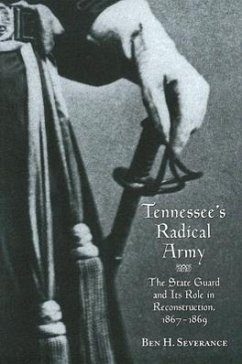During the tumultuous years of Reconstruction in the South, ex-Confederate vigilantes often threatened the safety and welfare of freedmen and newly elected Republican government officials. To combat this problem in Tennessee, Republican Governor William G. Brownlow relied of the Tennessee State Guard, a militia force of some two thousand men, five hundred of whom were African American. Brownlow used the State Guard to police elections, protect recently enfranchised freedmen, and thwart the operations of paramilitary groups such as the Ku Klux Klan. In "Tennessee's Radical Army, author Ben H. Severance draws upon a wealth of new research to argue that the State Guard successfully enforced the Reconstruction policies of the Radical Republican government from 1867 until its dissolution in 1869. Historians have often accused Governor Brownlow of abusing executive power during his administration: Severance argues, however, that although it was a partisan law enforcement body, the State Guard usually conducted itself with a high degree of discipline and restraint. When it was deployed during the political campaigns of 1867 and under the martial law decrees of 1869, the State Guard effectively subduted the intimidation and violence that ex-Confederates frequently used to suppress freedmen and to unscar Republicans. Severance contrasts these two campaigns with incidents in 1868, when the Klan terroized large portions of the state. The State Guard was not deployed in 1868, and both the Republican party and freedmen suffered as a result. In this first in-depth examination of the Tennessee State Guard, Severance describes the militia's origins, personnel, activities, and accomplishments, and heplaces the history of the State Guard within the larger story of the hard-fought battle for Reconstruction in Tennessee. The result is a profile of an organization that became an important tool of political policy and a force that should have been used for a greater length of
Hinweis: Dieser Artikel kann nur an eine deutsche Lieferadresse ausgeliefert werden.
Hinweis: Dieser Artikel kann nur an eine deutsche Lieferadresse ausgeliefert werden.








